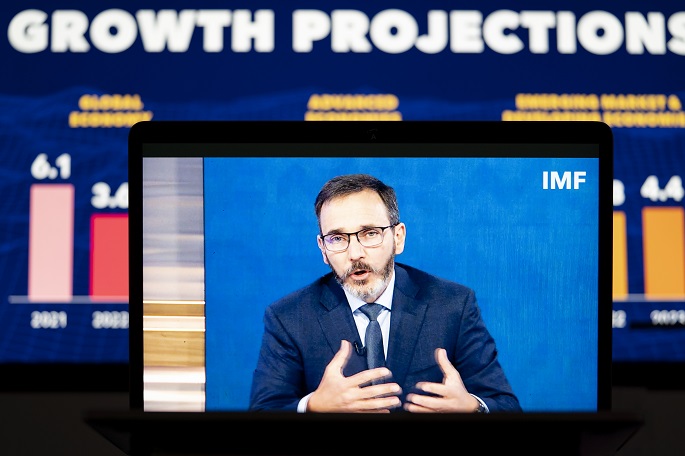IMF downgrades 2023 global growth forecast to 2.7%
Published : 11 Oct 2022, 20:07
Updated : 11 Oct 2022, 20:36
The International Monetary Fund (IMF) on Tuesday projected the global economy to grow by 3.2 percent this year and 2.7 percent in 2023, with a downward 0.2-percentage-point revision for 2023 from the July forecast, reported Xinhua, quoting the latest World Economic Outlook (WEO) report.
The global economy is experiencing "a number of turbulent challenges," as inflation higher than seen in several decades, tightening financial conditions in most regions, Russia-Ukraine conflict, and the lingering COVID-19 pandemic all weigh heavily on the outlook, the report said.
"This is the weakest growth profile since 2001 except for the global financial crisis and the acute phase of the COVID-19 pandemic and reflects significant slowdowns for the largest economies," the report noted.
A contraction in real gross domestic product (GDP) lasting for at least two consecutive quarters (which some economists refer to as a "technical recession") is seen at some point during 2022-2023 in about 43 percent of economies, amounting to more than one-third of world GDP, according to the report.
Noting that risks to the outlook remain unusually large and to the downside, the latest WEO report said that monetary policy could miscalculate the right stance to reduce inflation, more energy and food price shocks might cause inflation to persist for longer, and global tightening in financing conditions could trigger widespread emerging market debt distress.
The IMF warned that geopolitical fragmentation could impede trade and capital flows, further hindering climate policy cooperation.
"The balance of risks is tilted firmly to the downside, with about a 25 percent chance of one-year-ahead global growth falling below 2.0 percent - in the 10th percentile of global growth outturns since 1970," the report noted.
"The risk of monetary, fiscal, or financial policy miscalibration has risen sharply at the time of high uncertainty and growing fragilities," IMF chief economist Pierre-Olivier Gourinchas told a press conference at the 2022 Annual Meetings of the IMF and the World Bank on Tuesday.
"Global financial conditions could deteriorate, and the dollar strengthen further, should turmoil in financial markets erupt," said the IMF chief economist, noting that this would add significantly to inflation pressures and financial fragilities in the rest of the world, especially emerging markets and developing economies.
Inflation could, yet again, prove more persistent, especially if labor markets remain extremely tight, Gourinchas said.
Finally, the war in Ukraine is still raging and further escalation can exacerbate the energy crisis, he added.
The IMF argued that front-loaded and aggressive monetary tightening is "critical" to avoid inflation de-anchoring.
"The hard-won credibility of central banks could be undermined if they misjudge yet again the stubborn persistence of inflation. This would prove much more detrimental to future macroeconomic stability," Gourinchas said, urging central banks to keep a steady hand with monetary policy firmly focused on taming inflation.
The IMF chief economist noted fiscal policy should not work at cross-purpose with monetary authorities' efforts to bring down inflation. "Doing so will only prolong inflation and could cause serious financial instability, as recent events illustrated," he said.
In the latest report, the IMF also highlighted that the energy and food crises, coupled with extreme summer temperatures, are "stark" reminders of what an uncontrolled climate transition would look like.
"There are some cost of doing the climate transition on the macroeconomic side, these costs are very, very modest in comparison to the cost of not doing the climate transition," Gourinchas said at the press conference in response to a question from Xinhua.
Noting that climate transition is a "gradual" process, Gourinchas said the gains are much larger if that process is started early.
"So yes, we have to deal with energy crisis right now. Yes, a number of countries are facing themselves in a situation where they need to procure more energy to produce electricity over the winter, etc. But the path that we should embark on in terms of the climate transition is something that we cannot ignore as well," he said.


